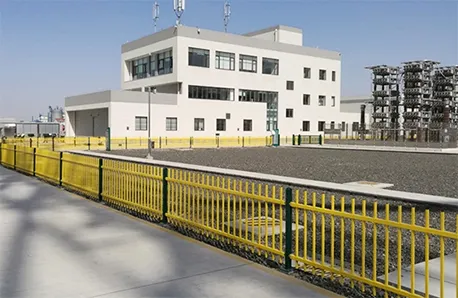Different Styles and Materials of Fencing Panels for Your Property
9 月 . 28, 2024 23:08
Types of Fencing Panels A Comprehensive Guide
Fencing panels play a crucial role in defining the boundaries of residential and commercial properties, providing security, privacy, and aesthetic appeal. With a wide array of materials and designs available, choosing the right fencing panel can significantly enhance your outdoor space. In this article, we will explore the various types of fencing panels, their advantages, and considerations to help you make an informed decision.
1. Wooden Fencing Panels
Wooden fencing panels are a classic choice for many homeowners. They offer a natural look that can blend seamlessly with the environment. Common types of wood used for fencing include cedar, pine, and redwood, each providing different levels of durability and resistance to decay.
Advantages - Aesthetic appeal Wooden panels come in various styles, such as picket, flat-top, and lattice. - Customization They can be easily painted or stained to match your home's exterior. - Environmentally friendly If sourced sustainably, wood is a renewable material.
Considerations - Maintenance Wooden panels require regular upkeep, including staining or sealing to protect against moisture and pests. - Lifespan They may not last as long as other materials, typically around 15-20 years depending on the type of wood and local climate.
2. Vinyl Fencing Panels
Vinyl fencing has gained popularity as an alternative to traditional wooden fences due to its durability and low maintenance requirements. Made from polyvinyl chloride (PVC), these panels come in various styles and colors.
Advantages - Low maintenance Vinyl panels do not require painting, staining, or treating, making them easy to clean. - Durability They are resistant to rot, insects, and harsh weather conditions. - Longevity Vinyl fences can last over 30 years, making them a long-term investment.
Considerations - Initial cost Vinyl fencing can be more expensive upfront compared to wood options. - Limited customization While available in various styles, vinyl fences may not offer the same rustic appeal as wood.
3. Metal Fencing Panels
Metal fencing panels, including aluminum and wrought iron, provide a robust and modern look. These materials are often chosen for their strength and durability.
types of fencing panels

Advantages - Security Metal panels are difficult to breach, offering enhanced protection. - Low maintenance They require minimal upkeep, with occasional painting or rust prevention. - Long lifespan Metal fences can last decades and withstand harsh weather conditions.
Considerations - Cost Metal panels can be more expensive than wood or vinyl. - Aesthetic limitations While elegant, metal fences may provide less privacy compared to solid wooden or vinyl panels.
Composite fencing combines wood fibers and plastic, offering a combination of the benefits of both materials. This type of fencing is designed to mimic the appearance of wood without the high maintenance.
Advantages - Durability Composite panels are resistant to rot, splintering, and fading. - Environmentally friendly Many composite materials are made from recycled products. - Low maintenance They do not require painting or staining.
Considerations - Cost Composite fencing can be a pricier option than traditional wood. - Variability The appearance can vary, and some products may not have the same look as natural wood.
5. Chain Link Fencing Panels
Chain link fencing is a practical choice often used for security purposes in both residential and commercial settings. It consists of interwoven steel wire, creating a cost-effective barrier.
Advantages - Affordability Chain link fencing is one of the most economical fencing options. - Visibility This type of fence allows visibility while providing a boundary. - Durability When properly galvanized, chain link fences can last a long time with little maintenance.
Considerations - Limited privacy Chain link fencing doesn't provide much privacy, which may not be ideal for residential use. - Aesthetic appeal It may not enhance the beauty of a property compared to other options.
Conclusion
When selecting fencing panels, it's essential to consider factors such as purpose, budget, and aesthetics. Wooden panels offer timeless beauty, while vinyl and composite are low-maintenance alternatives. Metal panels provide security and durability, and chain link is cost-effective for basic needs. By understanding the types of fencing panels available, you can choose the right solution that will meet your specific needs and enhance the value of your property.




















